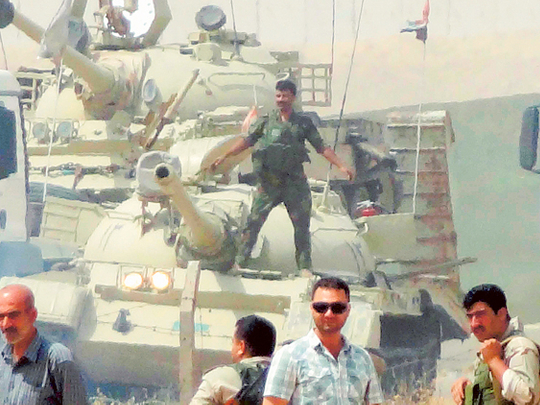
Dubai: Iraq is on the brink of total collapse as a functioning state as jihadist insurgents race towards Baghdad after gaining control of large swathes of the country and four major cities there in the past week.
The lightning gains made by well-armed, battle-hardened and disciplines jihadists from the Islamic State of Iraq and Syria have left them just 90km from Baghdad. And in the capital, parliament failed to achieve a quorum for an “emergency session” that was supposed to consider a request from Prime Minister Nouri Al Maliki and the president’s office to declare a state of emergency. Only 128 of 325 MPs showed up for the session, which was announced two days before, a senior official said.
A United Nations staffer stationed in Baghdad who preferred not to be named told Gulf News Thursday afternoon: “I think the state is in danger of total collapse. My boss told me to start sending out my resume. I left this morning.”
With the militants closing in on the capital, forces from Iraq’s autonomous Kurdish region took control of disputed northern oil hub of Kirkuk to protect it from jihadist attack, officials said.
And amid warnings from Washington that the jihadist offensive threatens the stability of the entire Middle East, Iranian President Hassan Rouhani warned that Tehran would combat “terrorism” in Iraq.
Isil spokesman Abu Mohammad Al Adnani promised the group would drive on to Baghdad and Karbala, a city southwest of the capital that is one of the holiest sites for Shiite Muslims, in a statement carried by jihadist websites.
Washington is considering several options for offering military assistance to Baghdad, including drone strikes, a US official told AFP on condition of anonymity.
Resorting to such aircraft — used in Afghanistan, Pakistan and Yemen in a highly controversial programme — would mark a dramatic shift in the US engagement in Iraq, after the last American troops pulled out in late 2011.
But there is no current plan to send US troops back into Iraq, where around 4,500 American soldiers died in the bitter conflict.
And British Foreign Secretary William Hague said there was “no question” of British troops being sent back.
The UN Security Council has called crisis talks for late Thursday morning in Ney York.
The militants overran Iraq’s second city Mosul on Tuesday before taking control of its surrounding province Nineveh and sweeping into Kirkuk, Salaheddin provinces, as well as northern Diyala.
They encountered little effective resistance from security forces, some of whom discarded their uniforms and joined tens of thousands of civilians, many of whom fled towards the relative safety of the autonomous Kurdistan region.
Militants also stormed the Turkish consulate in Mosul and kidnapped 49 people including the head of the mission and three children, a Turkish official said.
They were in addition to 31 Turkish truck drivers seized by Isil at a Mosul power station, and Ankara pledged harsh reprisals if any were harmed.
Isil fighters rode unopposed into Saddam Hussain’s birthplace of Tikrit. There, as in Mosul the day before, they quickly set up checkpoints, sacked government buildings and filled trucks with weapons and cash, some of which were quickly dispatched to Syria.
Militants also destroyed a police station in Baiji, site of Iraq’s largest refinery. Local officials said the insurgents withdrew after local tribal leaders persuaded them not to seize the refinery and power stations.
At least half a million residents of northern Iraq are reported to be on the move, with most attempting to flee to the Kurdish far north where border officials were overwhelmed and expecting refugee numbers to increase sharply in coming days.
The UN said it was scrambling to deal with the crisis. Save the Children said: “We are witnessing one of the largest and swiftest mass movements of people in the world in recent memory. The majority of Iraqis fleeing Mosul had to escape in a matter of minutes.”
As security unravelled in the country’s north and centre, the radical Shiite Islamic leader Moqtada Al Sadr threatened to reform the Mahdi army — a key protagonist in the sectarian war that nearly ripped Iraq apart in the wake of the US invasion. Militias had primacy nationwide during the worst of the war years and are once again ascendant as the Iraqi military’s authority crumbles.
Foreign minister Hoshyar Zebari urged Kurdish and central government leaders to set aside their differences to deal with the “mortal threat” facing the country. Kurdish authorities were letting nearly all new arrivals enter in an early sign of closer than normal cooperation.
For a second day, the road between Mosul and Kirkuk was choked with cars full of families who described chaos in the city as troops beat an undignified retreat.
— With inputs from agencies












